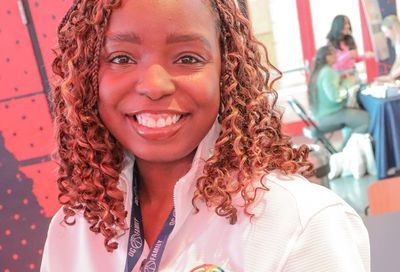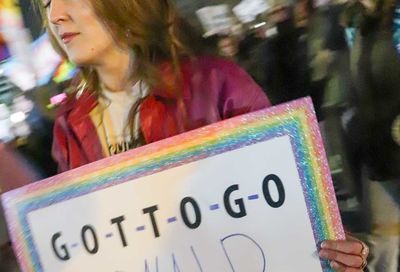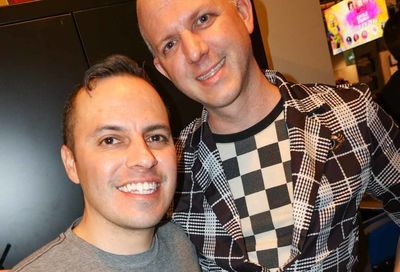Stein Club Schism
Democratic counsel recommends invalidating club's unusual recent election results, while others decry such a move as violation of bylaws
In response to a series of challenges brought against the results of the Dec. 3 officer elections for the Gertrude Stein Democratic Club, the District’s top LGBT political organization, a lawyer for the DC Democratic State Committee is recommending that the election results be invalidated and a new election be held.
At issue is the high number of first-time memberships purchased in the week prior to the election, when 46 new members joined; and questions about the eligibility of a number of new members for discounted ”special membership,” which is typically offered to college students, senior citizens and people of low incomes, according to the organization’s bylaws.
Usually, prospective Stein Club members pay $35 in dues to join, but so-called ”special memberships” cost $15. The organization’s bylaws do not detail what is considered ”low-income.”
In total, 17 memberships that have been flagged as questionable, 11 of which belong to people whose addresses could not be confirmed, and six that were purchased at the lower, special-membership rate, but whose employment information as provided on the membership list would seem to disqualify them from qualifying for the reduced dues intended for low-income members.
It was many of these newer members who are credited with propelling President-elect Martin Garcia and his slate, incoming Vice President for Legislative and Political Affairs Angela Peoples and incoming Vice President for Administration Vincent Villano, to narrow victories over incumbent Stein President Lateefah Williams and two members of her candidate slate, Jon Mandel and Hassan Naveed.
The remaining two members of Williams’s slate, Jimmie Lithuli and Barrie Daneker, ran unopposed and were re-elected secretary and treasurer, respectively, by affirmation.
Garcia, Peoples, Villano and Naveed were all among the 46 new members that joined the club in the week leading up to the election.
Because the Stein Club is an affiliate of the DC Democratic State Committee, the current members of the club’s executive board consulted Donald R. Dinan of Roetzel & Anderss, counsel for the DC Democratic State Committee, to advise them on how to proceed with the challenges to the election.
”Providing an incorrect or false address would be grounds for disqualifying a voter,” Dinan wrote in his opinion. ”Likewise, if one were to misrepresent their status in order to qualify for Special Membership and pay the lower dues, that misrepresentation would likewise disqualify the voter.”
Dinan said that because the employment, income and addresses of the 17 individuals in question could not be confirmed, the club had no opportunity to ensure its voter rolls were accurate and that all voters were eligible. Dinan further claimed that during his review of the membership list, searches of the Internet, social media and D.C. voter rolls were done to try and confirm the missing or questionable information.
”In this case, the number of questionable votes is greater than the margin of victory in each of the three races,” Dinan wrote. ”Because the election was by secret ballot, there is no way of knowing how each person [voted]. Therefore, the number of voters whose addresses and/or Special Membership status cannot be confirmed substantially affected the outcome of the election and would be grounds for invalidating the election.”
Dinan recommended that new elections be scheduled once ”the integrity of the voter rolls has been confirmed.”
Following Dinan’s advice, the executive board voted to hold a meeting to discuss the challenges and vote whether or not to invalidate the election results, according to a press release from Jerome Hunt, Stein’s current vice president for administration, who did not run for re-election. That meeting will be held on Wednesday, Dec. 19, at 7 p.m. in Room 120 of the John A. Wilson Building.
Hunt’s memo also said that executive board members whose election may be impacted by the findings resulting from the challenges – meaning Williams, the only incumbent to run for re-election in a contested race – did not vote on whether to put invalidation to the larger Stein Club membership.
The newly elected executive slate issued a statement opposing attempts to invalidate the election results.
”We are disappointed that the Stein leadership intends to challenge new members who want to contribute to Stein’s growth,” Garcia said in the statement. ”Stein’s membership rolls nearly doubled because of our recruitment efforts, and that’s a good thing. These new members are young people, people of color, and people from low-income background who were otherwise not engaged in Stein’s activities. … We should be having a special meeting celebrating these new members, and finding ways to engage them.”
Peoples called the special meeting a ”distraction” from moving forward as a united Stein Club to advance the interests of the LGBT community, and said she hoped to address the issues related to the election challenges when the club next meets.
Villano, in an interview with Metro Weekly, pointed out that the two complaints on which Dinan based his opinion are not supported by the club’s bylaws.
Villano said there is no residency requirement for members of Stein, and past Stein executive board officers have actively recruited members from Virginia and Maryland to join the club. Also, he said, because there are no guidelines in the bylaws for determining what qualifies as ”low-income,” the club can only – as it has in the past – rely on self-identification, and that attempting to probe into members’ financial situations is a breach of the club’s bylaws.
”Our election was just one step for Stein breaking down the perception that it’s an exclusive club,” Garcia said in a statement. ”We’re optimistic that at the special meeting, members will uphold these new voters, and the election because the next stage of Stein depends on a large and more diverse membership … putting too high of a dollar amount on that is not the right way to generate excitement among new members.”
But even longer-term Stein members not associated with either slate remain divided over the calls for the Dec. 19 meeting and possible invalidation of the results.
Kurt Vorndran, Stein Club president from 2000 to 2003, issued a statement supporting the move by the executive board.
”It would have been irresponsible for the executive committee to act without first seeking the advice of the DC Democratic Party’s legal counsel on this matter,” Vorndran said. ”Given the importance of this issue, it would have been irresponsible for them to decide this matter themselves rather than voting to call a special meeting to adjudicate it. And it would have been irresponsible for the incumbent president not to have recused herself during the executive committee vote.”
”In each of these situations, the persons involved acted in a responsible way, for which they deserve the appreciation of the club,” he added.
But Vorndran said it was also incumbent upon non-elected Stein members, particularly longtime members, to focus on the question of whether any rules were broken and not be influenced by any bias regarding the election results.
One Stein Club member and local activist, Lane Hudson, said he opposes the Dec. 19 meeting, arguing that it violates the bylaws by not being called with at least two weeks’ notice.
According to Stein’s bylaws, ”Special meetings may be called by written notice of the executive committee. Such meetings shall be announced to the membership by mail (electronic and/or surface) or at a General membership meeting not less than two weeks before said special meeting is to take place.”
Hudson, who was not present for the elections but said he would have supported the Williams-Mandel-Naveed slate, said that while many members may be unhappy with the results of the election, the fact is the insurgent slate won.
Hudson said he has notified the executive committee they are in violation of the group’s bylaws by calling the meeting, and says if such a meeting is held Dec. 19, he and others will be there to object on the basis of the short notice.
Hudson also took issue with the two types of challenges raised, pointing out, as did Villano, that the bylaws incluce no residency requirement, no requirement to keep a current address, nor any qualification guidelines for people seeking special reduced-price memberships.
”In a time of turmoil, the bylaws need to be followed,” Hudson said, adding that while the club may consider bylaw changes for the future, members should not consider changing them for the past.
Support Metro Weekly’s Journalism
These are challenging times for news organizations. And yet it’s crucial we stay active and provide vital resources and information to both our local readers and the world. So won’t you please take a moment and consider supporting Metro Weekly with a membership? For as little as $5 a month, you can help ensure Metro Weekly magazine and MetroWeekly.com remain free, viable resources as we provide the best, most diverse, culturally-resonant LGBTQ coverage in both the D.C. region and around the world. Memberships come with exclusive perks and discounts, your own personal digital delivery of each week’s magazine (and an archive), access to our Member's Lounge when it launches this fall, and exclusive members-only items like Metro Weekly Membership Mugs and Tote Bags! Check out all our membership levels here and please join us today!






















